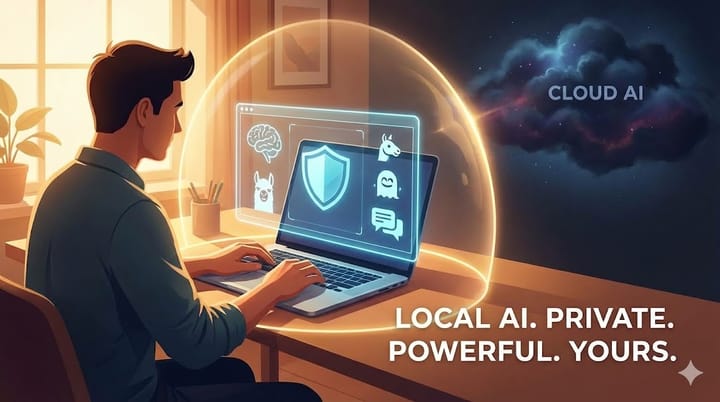AI is your Career Ally, Not Your Replacement

In an era where artificial intelligence (AI) is transforming industries at breakneck speed, it’s easy to fall into the trap of fearing that AI will render your job obsolete.
The narrative of machines “taking over” is a compelling one, often fueled by sci-fi tropes and sensational headlines.
But let’s cut through the noise: AI is not here to replace you—it’s here to empower you.
When wielded thoughtfully, AI is a tool that can amplify your skills, boost your productivity, and open new doors in your career.
ON AI is a reader-supported publication. To receive new posts and support my work, consider becoming a free or paid subscriber.
The AI Advantage: Enhancing, Not Erasing
AI’s strength lies in its ability to handle repetitive, data-heavy, or time-consuming tasks, freeing you to focus on what humans do best—creativity, critical thinking, and emotional intelligence.
Think of AI as a trusty sidekick, not a rival. For example:
- Writers can use AI tools like language models to brainstorm ideas, refine drafts, or generate outlines, while their unique voice and storytelling remain irreplaceable.
- Marketers leverage AI to analyze consumer data, predict trends, and personalize campaigns, allowing them to craft more impactful strategies.
- Developers use AI-powered coding assistants to write cleaner code faster, but the architecture of innovative software still demands human ingenuity.
- Healthcare professionals rely on AI for diagnostics and data analysis, yet patient care hinges on empathy and nuanced judgment—qualities no algorithm can replicate.
Far from stealing jobs, AI is reshaping roles to prioritize higher-value work.
A 2023 report from the World Economic Forum estimated that AI could create 97 million new jobs by 2025, many of which will require uniquely human skills like problem-solving and collaboration.
The catch? To stay ahead, you need to embrace AI as a tool in your toolkit.
How to Harness AI in Your Career
Here’s how you can integrate AI to supercharge your professional growth:
Automate the Mundane
Use AI tools to handle repetitive tasks. For instance, tools like Zapier or AI-driven scheduling apps can streamline administrative work, giving you more time for strategic projects.
Upskill with AI
Platforms like Coursera or LinkedIn Learning use AI to recommend courses tailored to your career goals.
Learn how to use industry-specific AI tools—whether it’s Tableau for data visualization or MidJourney for design—to stand out.
Enhance Decision-Making
AI can process vast datasets to provide insights.
If you’re in finance, tools like Bloomberg Terminal’s AI features can help analyze market trends, but your expertise contextualizes those insights.
Personalize Your Output
AI can help you tailor your work to specific audiences.
Sales professionals, for example, can use AI-driven CRM systems to craft personalized pitches, while teachers can use AI to customize lesson plans for diverse learners.
Stay Curious
Experiment with tools like Grok (created by xAI) to explore ideas, answer complex questions, or even simulate scenarios for strategic planning.
The more you engage with AI, the more you’ll uncover its potential to amplify your work.
The Human Edge
AI excels at pattern recognition and processing, but it lacks the human touch.
Emotional intelligence, ethical judgment, and the ability to navigate ambiguity are where you shine.
A machine can analyze customer feedback, but only you can interpret the nuances of a client’s tone during a tense meeting.
AI can generate a design, but your creative vision sets the aesthetic.
The future belongs to those who combine AI’s efficiency with human intuition.
Addressing the Fear Factor
It’s natural to worry about job security in an AI-driven world, but history shows that technology creates as many opportunities as it disrupts.
The rise of computers didn’t eliminate jobs; it birthed entirely new industries, from software development to cybersecurity.
AI is no different. Roles like AI ethicists, prompt engineers, and human-AI collaboration specialists are already emerging.
The key is adaptability—learning to work alongside AI rather than resisting it.
Getting Started
Ready to make AI your career ally? Start small:
- Identify one repetitive task in your workflow and find an AI tool to streamline it.
- Dedicate an hour a week to exploring AI applications in your field.
- Join online communities or forums to learn how peers are using AI effectively.
The Bottom Line
AI isn’t your replacement—it’s your rocket fuel. By embracing it as a tool, you can work smarter, not harder, and position yourself as a leader in your field.
The future of work isn’t about humans versus machines; it’s about humans with machines, creating value in ways we’re only beginning to imagine.
So, dive in, experiment, and let AI help you unlock your full potential.
What’s one way you’re already using or planning to use AI in your career? Share your thoughts in the comments—I’d love to hear how you’re making AI work for you!
ON AI is a reader-supported publication. To receive new posts and support my work, consider becoming a free or paid subscriber.



Comments ()